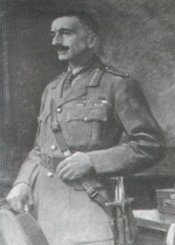Edmond William Costello
| Edmund William Costello | |
|---|---|

Edmund Costello VC
|
|
| Born | 7 August 1873 Sheikhbudia, North-West Frontier, India |
| Died | 7 June 1949 (aged 75) |
| Buried | St Mark's Church, Hadlow Down, Sussex, England |
| Allegiance |
British India |
| Service/branch |
Indian Army |
| Years of service | 1892–1923 |
| Rank | Brigadier-General |
| Unit |
West Yorkshire Regiment 22nd Punjab Infantry 24th Punjab Infantry |
| Commands held |
12th Indian Brigade 8th (Jullundur) Brigade Palestine Defence Force |
| Battles/wars | |
| Awards |
Victoria Cross Companion of the Order of St Michael and St George Commander of the Royal Victorian Order Companion of the Distinguished Service Order Mentioned in Dispatches (7) Croix de Guerre (France) |
| Other work | Director of Military Studies, University of Cambridge |
Malakand Frontier War
World War I
Brigadier-General Edmund William Costello VC CMG CVO DSO (7 August 1873 – 7 June 1949) was a British Indian Army officer and a recipient of the Victoria Cross, the highest and most prestigious award for gallantry in the face of the enemy that can be awarded to British and Commonwealth forces.
Costello was born in Sheikhbudia on the North-West Frontier of India, the son of a colonel in the Indian Medical Service. He was educated in England at Beaumont College, Stonyhurst College and the Royal Military College, Sandhurst. In 1892 he was commissioned into the West Yorkshire Regiment, but transferred to the Indian Army in 1894 and was posted to the 22nd Punjab Infantry.
He was 23 years old, and attached to the 24th Punjab Infantry during the Malakand Frontier War, when the following deed took place for which he was awarded the VC:
On 26 July 1897 at Malakand on the Indian Frontier, Lieutenant Costello went out from the hospital enclosure and with the assistance of two sepoys, brought in a wounded lance-havildar who was lying 60 yards (55 m) away, in the open, on the football ground. This ground was at the time over-run with swordsmen and swept by a heavy fire from both the enemy and our own men who were holding the sapper lines.
...
Wikipedia
